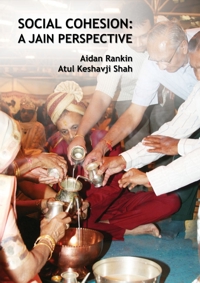Genuine inclusiveness requires a belief in equality and non-superiority over others. It also means that difference is not only allowed, not only tolerated, but positively supported and nurtured. Difference is the mosaic which weaves society together and enriches its wisdom. Investment in awareness and understanding about different cultures and belief systems does help, but what is most prohibitive is a closed mind, or one which feels it is exclusive and superior to other thought systems and beliefs.
Jains have embraced bio-diversity as a starting point for respect. Most modern thinking ignores the connection between human diversity and bio-diversity and focuses far too much on humanity and its tensions. If the problem is decontextualised, and nature seen as the basis of all creation and the source of beauty and diversity, we can bring about a change in mindset and attitudes. Nature should not be seen as something to be used and exploited at will. Only then will we be able to build a genuine inclusiveness in society. What this also does is to promote the wider inclusiveness of nature and animals in promoting respect in society.
History and Geography are good subjects for teaching diversity, and so is Religious Education. However, the content of these subjects need to be sensitive to different belief systems and their stories and experiences, and not written from a mono-cultural perspective. The histories of the diverse communities, including minorities, who live in Britain, should be part of the core education curriculum in schools. Such subjects should not be compartmentalised, and instead inter-connections explained. Whole stories of migration and settlement will help the process of inclusiveness.
Ghettoes and mono-cultural neighbourhoods are a problem. However, they have often arisen as a defensive mechanism to help minorities retain their dignity and cultural identity. As inclusiveness spreads and is genuinely felt, people will migrate to different neighbourhoods and we will see more and more mixed communities. However, it is difficult to force these changes: instead, we must create the conditions for social evolution, through an ethos of flexibility, tolerance and mutual understanding as the basis of every social policy. In this way extremism, whether racist or fundamentalist in character, will be deprived of its breeding grounds of social division and cultural misunderstanding. Economic inequality can lead to social deprivation and a lack of social cohesion. It is important then to alleviate economic problems for there to be a respectful society. However, this should not be blamed as a reason for intolerance. Economic deprivation is a collective problem which requires a sensitive approach and a long-term solution and commitment by all concerned, especially the rich. Government and social services have a uniquely challenging role to remove such deprivation. There should be a dedicated long-term effort to resolve such problems and a culture of long-termism encouraged in this arena.
The media have a special role to play in building community cohesion. The government could support quality media which provide information about cultures, positive examples of cooperation, techniques of parenting, benefits of continuous education, methods of dialogue and direct engagement, creative ideas about raising children with an open mind, and showing ways of discovering common values. Satish Kumar, a Jain, publishes Resurgence magazine which provides a holistic approach to ethical living, integrating art, science and spirituality.
Diversity means more than simply celebrating difference. It also means looking beneath these differences for shared values and common interests. The legal principles of equality and unity-in-diversity are a good expression of Jain values and ethics.
 Aidan Rankin
Aidan Rankin
 Dr. Atul Keshavji Shah
Dr. Atul Keshavji Shah
